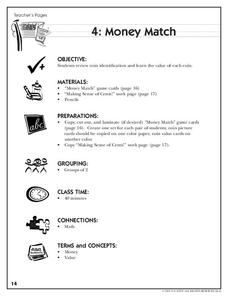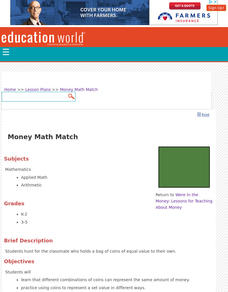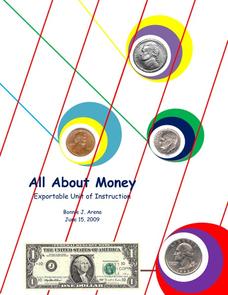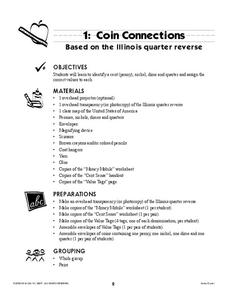Curated OER
Counting Money
Money is always a source of interest for young mathematicians, so utilize their engagement by adding up coin values. For each set of coins (quarter, dime, nickel, and penny) scholars count up and write the total. The example has them...
Curated OER
Number Value Assessment
Quiz your second graders with this set of math worksheets involving place value, word problems, number sequence, greater than/less than, coin value, expanded form, and much more! Most have multiple choice answers provided, and generally...
Curated OER
Identifying Coins and Their Value
Use the special Tennessee State Quarter as a learning tool. During this lesson plan, discuss why the Tennessee Quarter has musical instruments on it. You can also utilize a worksheet embedded in the plan to help your class compose a song...
Curated OER
Alexander Used to Be Rich
Reading Alexander, Who Used to Be Rich Last Sunday, launches this lesson plan appropriate for children who recognize coins and have been introduced to coin values. Using addition and subtraction skills, the class tracks Alexander’s...
Curated OER
Money Match
Playing a game can be educational, pupils use this matching activity to identify coins and their values. This is a great way to have learners practice their money sense.
Curated OER
Money Math Match
Learners hunt for the classmate who holds a bag of coins equal in value to theirs, study that different combinations of coins can represent the same amount of money and practice using coins to represent a set value in different ways.
DK Publishing
Money Word Problems #1
Having money problems? How about 19 more? Scholars begin with 10 money-related word problems, some requiring they understand different coin values. They add and subtract for these, and although there are also opportunities for division...
Curated OER
Money: Demonstrating Coin Value up to $1.00
Students examine coin values up to $1.00 using paper coins. For this coin value lesson, students compare and contrast various coins to aid in identification, sort coins from smallest to largest, and match an equal number of pennies to...
Curated OER
All About Money
Few topics engage young mathematicians as much as learning about money. Through a series of shared readings and hands-on activities, children explore the US currency system, learning how to count money and calculate change as they create...
Curated OER
Which Coin?
Manage your money with change purses and piggy banks. Once they match different coins to corresponding price tags, first and second graders add the amounts of change in each illustration. For extra practice, bring in small items for kids...
Curated OER
Adding Money
Show young economists that adding money is just like adding the numbers they are used to. They complete two addition tables, adding monetary values under 50 cents. There are a couple done for them to give guidance, but learners must...
Curated OER
Casting Coins
This wonderful art instructional activity invites students to design and “mint” coins bearing their own symbols. A simple carving andcasting process using Blick Wonder-Cut®linoleum and modeling clay is described in the plan. Coins can be...
Curated OER
Money
Which coins do you need? Scholars are faced with a challenge: using only three coins they must find the exact amount needed for six items. The coins are standard US currency and are pictured at the top, however their value is not listed....
Curated OER
Equal Value
Which coins add up to these values? Young mathematicians examine five cent values, circling the coins needed to amount to them. Next, they compare money values in four sets of coins. First, learners add up each set to find the total...
Curated OER
Coin Connections
A wonderful lesson on identifying the penny, nickel, dime, and quarter awaits your young mathematicians. They engage in a multi-session lesson which allows them to practice using the values of each coin in worksheets and activities...
Curated OER
Problem Solving Using Coin Identity and Coin Value
Students identify characteristics of a penny, nickel, dime, and quarter, match the value of coins, and practice using money for a purchase.
Illustrative Mathematics
Money in the Piggy Bank
It's time to crack open that piggy bank and see what's inside. First, count up the pennies, nickels, dimes, and quarters, identifying what fraction of them are dimes. Then calculate the total value of the coins, writing another fraction...
Curated OER
The Value of Coins
How much is a penny, nickel, dime, and quarter worth? Learners count and make various coin variations that equal a given denomination. Each slide contains images and explanations on how one should count coins to add them up.
Curated OER
Saving Money
After listening to the wonderful book, A Chair for my Mother, young mathematicians engage in an awesome lesson about coins and the value of saving money. The lesson is done in a classic style - everything is beautifully organized, and...
Curated OER
Coin Motion
Students recognize coins and their values and count coin groups. They play a game where when music is turned on they skip, hop, jog and when it is turned off, they go to a spot in the room marked with the same coin or value as is in...
Curated OER
Identify Coins
Kill two birds with one stone (as they say). Your class can practice problem solving skills, basic addition and subtraction, as well as work on coin values. This worksheet includes six money related word problems to solve.
Curated OER
Combining Coins to Make Equal Monetary Amounts
Third graders determine how to make equivalent amounts of money using different sets of coins. In this money lesson, 3rd graders review money vocabulary and coin values before determining how to count bills and coins in different sets to...
Curated OER
Stamping Coins
Learners demonstrate that they can use a variety of coin combinations to make a single amount. They study all the ways to make 50 cents using coins using different coins.
American Museum of Natural History
Mint Your Own Coin
Provide young archaeologists with an opportunity to craft their own artifacts. The step-by-step directions in an engaging resource show them how to mint their own coin, complete with image, date, and motto.

























